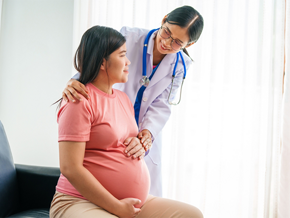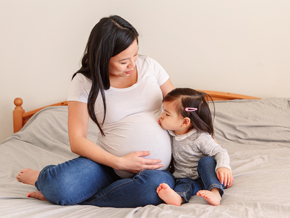
6 Weeks Pregnant: Your Baby’s First Heartbeat and Key Symptoms
Some of your baby’s biggest developments are already underway when you’re 6 weeks pregnant. Their brain and heart are beginning to form, which can trigger pregnancy symptoms like fatigue and morning sickness.
Here’s your guide to the key changes in your body, your baby’s rapid progress, and how to care for yourself during this exciting week.
Your Baby’s Growth at Week 6
At 6 weeks pregnant, your baby’s size is about that of a baked bean and measures around 6 mm (0.6 cm or 0.25 in), according to the NHS UK.
Your baby’s appearance
At this stage, your baby has a distinct C-shaped curve and a large head. This tadpole-like shape comes from the rapid development of the brain and spine.
The tiny "tail" at the end is your baby's developing spine, which will soon disappear as the legs and buttocks grow around it.
The first signs of a heartbeat
One of the most exciting developments this week is the formation of your baby’s heart. According to the American Pregnancy Association, a heartbeat may even be detectable on a transvaginal ultrasound.
Organ and limb formation
Inside your baby's body, buds that will become arms and legs begin to sprout. Facial features, such as the eyes and nostrils, are also starting to form as dark spots. The liver, lungs, and kidneys are all beginning to take shape.
Your Body at 6 Weeks Pregnant

Progesterone is one of the hormones thought to cause bloating at 6 weeks pregnant.
At Week 6, you’re in that timeframe—about two weeks after a missed period—when you might start to feel the first noticeable symptoms of pregnancy.
Morning sickness and fatigue
At 6 weeks pregnant, symptoms like nausea and fatigue are just a few of the most common early signs you might experience. These signs are due to a rise in pregnancy hormones like human chorionic gonadotropin (hCG) and progesterone.
You may want to try eating small, frequent meals and resting to help relieve these symptoms.
Tender breasts and bloating
Your breasts may feel sore, tingly, or heavy, and the areolas might darken, typical breast changes at 6 weeks pregnant. You may also feel quite bloated as hormonal changes slow your digestion.
Spotting or light bleeding
Seeing a small amount of blood can be alarming, but light spotting at 6 weeks pregnant can be a typical occurrence. The Cleveland Clinic notes that about 15% to 25% of pregnancies in their first 12 weeks involve some bleeding.
Light bleeding can be due to the embryo implanting into the uterine wall as well as hormonal changes. But always mention any type of bleeding at 6 weeks pregnant to your doctor to rule out any complications.
Changes in discharge
You may also notice an increase in milky white and thin vaginal discharge. This is known as leukorrhea and is your body’s way of protecting the birth canal from infection.
What to Eat This Week
At 6 weeks pregnant, the food to eat should be nutrient-dense. While a balanced diet is essential, a few vitamins and minerals are especially critical right now:
- Folic acid is the most essential nutrient at this stage. According to the Centers for Disease Control and Prevention (CDC), folic acid helps prevent serious birth defects by supporting the healthy development of your baby's brain and spine.
- Iron helps make the extra blood you and your baby need. You can find it in lean meats and beans.
- Calcium builds your baby's bones and teeth. Good sources include milk and dark leafy greens.
- Protein acts as a building block for your baby’s entire body. Find it in lean meats, eggs, and legumes.
While you can get these from whole foods, your doctor may recommend prenatal vitamins to make sure you're getting the right amount of every essential nutrient.
Self-Care Tips for Week 6

Feeling exhausted is typical when you’re 6 weeks pregnant. Prioritize seven to nine hours of sleep and naps to combat fatigue.
Here are a few simple tips to support your physical and emotional well-being during week six.
- Aim for seven to nine hours of sleep per night and take short naps to combat fatigue. Check these tips on how to get a good night’s sleep while pregnant.
- Light exercises like walking can also boost your energy levels and mood.
- If you're feeling overwhelmed, consider talking to your partner or a trusted friend about your feelings.
- Be kind to yourself when you're experiencing mood swings.
- Now is also the perfect time to schedule your first prenatal appointment with your doctor or midwife.
When to Seek Medical Advice
When it comes to pregnancy signs, you want to know what’s typical and what’s not. Call your doctor right away if you experience any of the following:
- Heavy bleeding or bright red blood
- Severe abdominal or pelvic cramping
- Pain on one side of your abdomen
- Foul-smelling vaginal discharge or a fever
- Sudden disappearance of pregnancy symptoms
Frequently Asked Questions
Is 6 weeks too early for an ultrasound?
Not necessarily. Your doctor may schedule an early ultrasound to confirm the pregnancy, check for a heartbeat, and more accurately determine your due date.
A 2024 study in Ultrasound in Obstetrics & Gynecology highlights that ultrasounds in the first trimester are effective for spotting certain placenta conditions early on, which helps ensure you get specialized care sooner if needed.
Can you have sex while 6 weeks pregnant?
Yes, for most low-risk pregnancies, it is physically safe to have sex. Your baby is well-protected inside your uterus.
However, don't be surprised if you're not exactly in the mood. A 2024 systematic review in Public Health Reviews found that it's very common for women to have their lowest sexual desire during the first trimester due to fatigue and hormonal changes.
Many find their desire returns in the second trimester, so the most important thing is to listen to your body and communicate with your partner.
Is it safe to fly at 6 weeks pregnant?
Always clear your travel plans with your doctor. They can provide the best advice tailored to your personal health history and destination.
There’s a lot of unseen progress happening when you’re 6 weeks pregnant: your baby’s organs are forming, and your body is working hard to adjust. Listen to your body’s need for rest and remember these early symptoms are part of an incredible journey.
Connect with other parents on the ParentTeam Moms and Dads Facebook group and share your experiences about being 6 weeks pregnant!
Reference
American College of Obstetricians and Gynecologists. "Changes During Pregnancy." American College of Obstetricians and Gynecologists. Accessed September 1, 2025. https://www.acog.org/womens-health/infographics/changes-during-pregnancy.
American College of Obstetricians and Gynecologists. "Morning Sickness: Nausea and Vomiting of Pregnancy." American College of Obstetricians and Gynecologists. Accessed September 1, 2025. https://www.acog.org/womens-health/faqs/morning-sickness-nausea-and-vomiting-of-pregnancy.
Cleveland Clinic. "Fetal Development: Stages of Growth." Cleveland Clinic. Last reviewed March 19, 2024. Accessed September 1, 2025. https://my.clevelandclinic.org/health/articles/7247-fetal-development-stages-of-growth.
Eunice Kennedy Shriver National Institute of Child Health and Development. "Pregnancy." Eunice Kennedy Shriver National Institute of Child Health and Development. Accessed September 1, 2025. https://www.nichd.nih.gov/health/topics/factsheets/pregnancy.
Männer, Jürgen. "When Does the Human Embryonic Heart Start Beating? A Review of Contemporary and Historical Sources of Knowledge about the Onset of Blood Circulation in Man." Journal of Cardiovascular Development and Disease 9, no. 6 (2022): 187. https://doi.org/10.3390/jcdd9060187.
Medical News Today. "When Does a Fetus Have a Heartbeat?" Medical News Today. Accessed September 1, 2025. https://www.medicalnewstoday.com/articles/when-does-a-fetus-have-a-heartbeat.
MedlinePlus. "Fetal Development." MedlinePlus. Last reviewed August 23, 2023. Accessed September 1, 2025. https://medlineplus.gov/ency/article/002398.htm.
Planned Parenthood. "What Happens in the Second Month of Pregnancy?" Planned Parenthood. Accessed September 1, 2025. https://www.plannedparenthood.org/learn/pregnancy/pregnancy-month-by-month/what-happens-second-month-pregnancy.
Singh, Rahul, and Sunil Munakomi. "Embryology, Neural Tube." In StatPearls. Treasure Island, FL: StatPearls Publishing, 2025. Updated May 1, 2023. Accessed September 1, 2025. https://www.ncbi.nlm.nih.gov/books/NBK542285/.




























